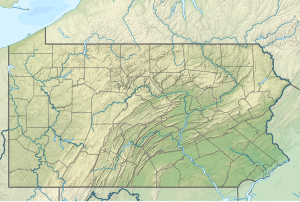Brinker Run (Sewickley Creek tributary)

| Brinker Run Tributary to Sewickley Creek | |
|---|---|
| Location | |
| Country | United States |
| State | Pennsylvania |
| County | Westmoreland |
| Physical characteristics | |
| Source | North Branch Sewickley Creek divide |
| • location | about 0.25 miles northwest of Humphreys, Pennsylvania[2] |
| • coordinates | 40°15′44″N 079°28′54″W / 40.26222°N 79.48167°W[1] |
| • elevation | 1,170 ft (360 m)[2] |
| Mouth | Sewickley Creek |
• location | United, Pennsylvania[3] |
• coordinates | 40°13′06″N 079°30′38″W / 40.21833°N 79.51056°W[1] |
• elevation | 965 ft (294 m)[3] |
| Length | 3.41 mi (5.49 km)[4] |
| Basin size | 3.49 square miles (9.0 km2)[5] |
| Discharge | |
| • location | Sewickley Creek |
| • average | 5.10 cu ft/s (0.144 m3/s) at mouth with Sewickley Creek[5] |
| Basin features | |
| Progression | Sewickley Creek → Youghiogheny River → Monongahela River → Ohio River → Mississippi River → Gulf of Mexico |
| River system | Monongahela River |
| Tributaries | |
| • left | unnamed tributaries |
| • right | unnamed tributaries |
| Bridges | Myers Road, Ludwig Road, Firestone Road, Pinto Lane, Mount Pleasant Road, Sportsman Road, Brinkerton Road |
Brinker Run is a 3.41 mi (5.49 km) long 2nd order tributary to Sewickley Creek in Westmoreland County, Pennsylvania.
Course
[edit]Brinker Run rises about 0.25 miles northwest of Humphreys, Pennsylvania,[2] and then flows southwest to join Sewickley Creek at United.[3]
Watershed
[edit]Brinker Run drains 3.49 square miles (9.0 km2) of area, receives about 42.9 in/year of precipitation, has a wetness index of 367.95, and is about 43% forested.[5]
References
[edit]- ^ a b "GNIS Detail – Brinker Run". geonames.usgs.gov. US Geological Survey. Retrieved 17 November 2020.
- ^ a b c "Get Maps". USGS Topoview. US Geological Survey. Retrieved 17 November 2020.
- ^ a b c "Get Maps". USGS Topoview. US Geological Survey. Retrieved 17 November 2020.
- ^ "ArcGIS Web Application". epa.maps.arcgis.com. US EPA. Retrieved 16 November 2020.
- ^ a b c "Brinker Run Watershed Report". US EPA Geoviewer. US EPA. Retrieved 17 November 2020.

